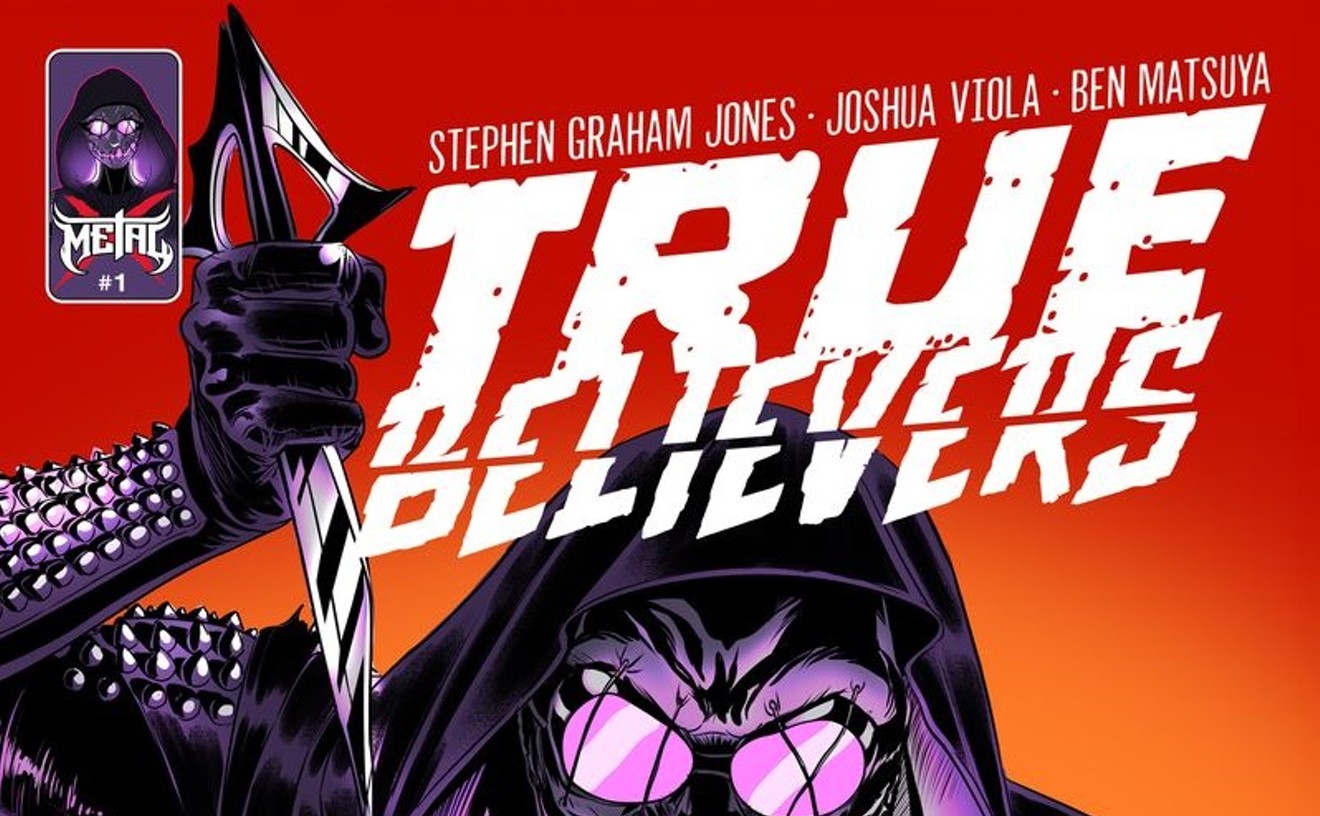If Opera Colorado's world-premiere production of composer Lori Laitman’s adaptation of Nathaniel Hawthorne's The Scarlet Letter, which debuts May 7 at the Ellie, is a hit with staying power, it may one day be thought of in the repertoire simply as “Laitman’s Scarlet Letter.”
But opera is a team sport. The original multimedia event, opera crams music, performance, movement and design into an experience meant to ravish the senses. Its successful execution requires an array of performers, musicians, directors, producers, designers and a small of army of craftspeople and assistants.
All of those participants are key. Few remember any of Verdi’s librettists, or who directed the premiere of Otello, or who was the first to sing di Luna in Il Trovatore. Without them, though, Verdi would have wound up just humming to himself at a keyboard.
Below, three of the key people behind The Scarlet Letter sound off.
The Poet: David Mason
David Mason is is the chair of the English Department at Colorado College and a former poet laureate of Colorado. The librettist for The Scarlet Letter, he and Laitman are working next on an opera based on his 2010 verse-novel, Ludlow.
Westword: So, you’re a poet. What does a job like that pay?
David Mason: You know, it’s only one letter removed from poverty [laughs]. It’s a life, it’s a calling.
Is it more difficult to adapt a piece than to create an original work, especially in collaboration and for performance?
No, it’s really not. It’s an utter joy. One of the things it teaches you is that you don’t really own your words. You are writing dramatically as a gift to other people so that they can give their gifts to the work. We have a great director, Beth Greenberg; this incredible cast; and a veritable city of artists who are all contributing to bringing this to life. So that’s very different from my usual life as an artist – my poems, essays, reviews being where I own my work, in that sense.
To adapt something is incredibly liberating and intoxicating. You have to get practical. What are the major scenes? Who’s in them? What’s at stake? You have to work poetically and dramatically at the same time.
I met Lori Laitman when she set one of my poems to music. [Laitman has written more than 250 concert songs to date, setting the work of many writers.]The poem was never written with music in mind, but she turned in into a mini-opera. So we’ve done a lot – the oratorio Vedem, a sequence of my more recent poems. And in May, a new one-act opened that I did with composer Tom Cipullo, After Life. There’s a lot going on.
At what point is your job done as librettist?
Last weekend we revised the ending, and it seems pretty set now – which is not to say that in the future we might deem more changes. Everybody benefits from improvements. When singers ask if they can change a word, well, they are a bunch of highly skilled professionals, and I listen to them and think about them. The wonderful Ari Pelto, too, who’s conducting, really brought a lot of wonderful ideas to bear on this thing.
Already various songs, arias, from this opera are out there. People use them as concert pieces, or audition or recital pieces, and when I hear them, the hair just rises on my arms. I really think we have a hit on our hands.
The Director: Beth Greenberg
Beth Greenberg was a longtime light of the late New York City Opera, and has earned plaudits for staging new work by such composers as Heggie, Okoye, Eaton and Cohen. Her innovative ,site-specific staging of Il Tabarro garnered attention as well.
Westword: How much time do you get to put it all together?
Beth Greenberg: We have three weeks in the studio, a week on stage, and then we’re on. You have to have a lot of things right from the get-go. I mean, we have the libretto and the full score, so we know what the staging will be. You have to fill in the detail and lock it in.
Is it harder to stage a new work than it is to stage a classic opera?
I think old things are harder, because we know them so well. I’m not really into the high-concept operas. I think you have to find a new way of telling the story, but you have to develop it from the inside out – don’t plop on a conception. In the case of The Scarlet Letter, no one’s done it before, so there’s a wonderful freedom. You don’t have to be completely naturalistic, either. The opening scene is very abstract – it’s not a bunch of Pilgrims in a Thanksgiving tableau.
Opera music has become more melodic over the past two decades. Does that help propel a narrative?
Ii all starts with how Dave told the story. Then Lori writes these gorgeous flowing lines over these thorny harmonies – it’s just incredible. I guess you could call it bel canto nuovo, or neo-bel canto. We should copyright that!
It seems like there are more new American operas than ever before.
It’s ironic that after the recession — when we lost so many great opera companies, including my New York City Opera – at the same time, an extraordinary amount of money is being put into commissions for new operas. American Opera Projects has been around for 25 years, the Frontiers series in Fort Worth showcases new scenes from operas there. Just to show you how crazy it is, the night we open, the world premiere of The Shining adaptation happens at Minnesota Opera; JFK opens in Fort Worth; and there’s a revival of Jake Heggie’s Great Scott in San Diego. This is a huge boom time. I think we’re in a golden age of American opera, I really do.
Is Hester Prynne a proto-feminist?
She’s America’s first feminist – definitely the first single working mom! She’s very heroic. The first scene is very bloodthirsty – she’s up on the scaffold, holding her baby, and the crowd’s menacing her, singing, “One law! One law!” And she doesn’t back down.
Does it resonate with what’s happening in America now, especially considering the upcoming elections?
We have a very different America now; a whole new spectrum is opening up. History goes through these big cycles, though: People get terrified, and become protective, and then they start to build walls. I hope we are not going to enter a dark age. I appreciate how far we've come.
Of course, I’m prejudiced, but I think this is going to become a classic. I think it’s going to go everywhere.
The Baritone: Malcolm MacKenzie
Malcolm MacKenzie plays Roger Chillingworth, a third of the sort-of romantic triangle in the work, who torments his nemesis, Dimmesdale, Hester Prynne’s former lover. MacKenzie has already tackled many of the standard baritone roles, including Almaviva, Papageno and Rigoletto.
Malcolm MacKenzie: It’s difficult to tell you how much fun I’m having. I love the piece in a way I’m surprised at. Chillingworth is one of the most interesting characters I’ve had to portray, and this is some of the most beautiful music I’ve ever had to sing!
The genius of the Hawthorne novel is that the characters are so well-described and yet so ambiguous that you can really sink your teeth into them. Especially Chillingworth – for a baddie, he’s a most interesting bad guy.
Westword: It seems like baritones always have to play bad guys.
I don’t get tired of being the baddie. It’s more fun! And you are one of the primary moving forces within the piece.
It really is a revelation to work with Lori Laitman. She’s a remarkably sensitive composer when it comes to motifs. My character has a set theme, meant to display my single-mindedness, so whenever he speaks, you hear that theme. Now, Hester’s vocal lines are a cornucopia. She’s on the outside of society, so her sounds aren’t like anyone else’s; they're beyond the tight social structure she’s stuck in. It’s remarkably beautiful and complex.
Being an opera singer involves lots of travel and planning. How booked out are you in advance?
I only plan out about a year in advance. I go to the Met next. We have two daughters, so that’s a huge focus of mine – to be somebody’s dad, so I’m the stay-at-home dad, too. So I’ll work maybe four or five jobs a year, and I do not work in the summer. I’ve been very lucky to do both of these things.
And I’m lucky to create this role. It’s pretty amazing. Beautiful, unpretentious, finely crafted music.
Opera Colorado presents the world-premiere production of Lori Laitman’s The Scarlet Letter on May 7, with additional performances on May 10, 13 and 15 at the Ellie Caulkins Opera House in the Denver Performing Arts Complex. For tickets and information, visit operacolorado.org.
[
{
"name": "Air - MediumRectangle - Inline Content - Mobile Display Size",
"component": "12017618",
"insertPoint": "2",
"requiredCountToDisplay": "2"
},{
"name": "Editor Picks",
"component": "17242653",
"insertPoint": "4",
"requiredCountToDisplay": "1"
},{
"name": "Inline Links",
"component": "18838239",
"insertPoint": "8th",
"startingPoint": 8,
"requiredCountToDisplay": "7",
"maxInsertions": 25
},{
"name": "Air - MediumRectangle - Combo - Inline Content",
"component": "17261320",
"insertPoint": "8th",
"startingPoint": 8,
"requiredCountToDisplay": "7",
"maxInsertions": 25
},{
"name": "Inline Links",
"component": "18838239",
"insertPoint": "8th",
"startingPoint": 12,
"requiredCountToDisplay": "11",
"maxInsertions": 25
},{
"name": "Air - Leaderboard Tower - Combo - Inline Content",
"component": "17261321",
"insertPoint": "8th",
"startingPoint": 12,
"requiredCountToDisplay": "11",
"maxInsertions": 25
}
]











